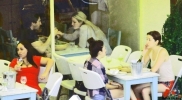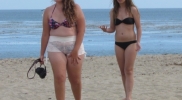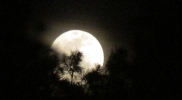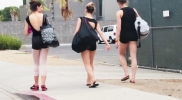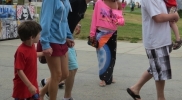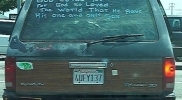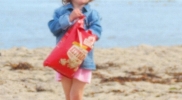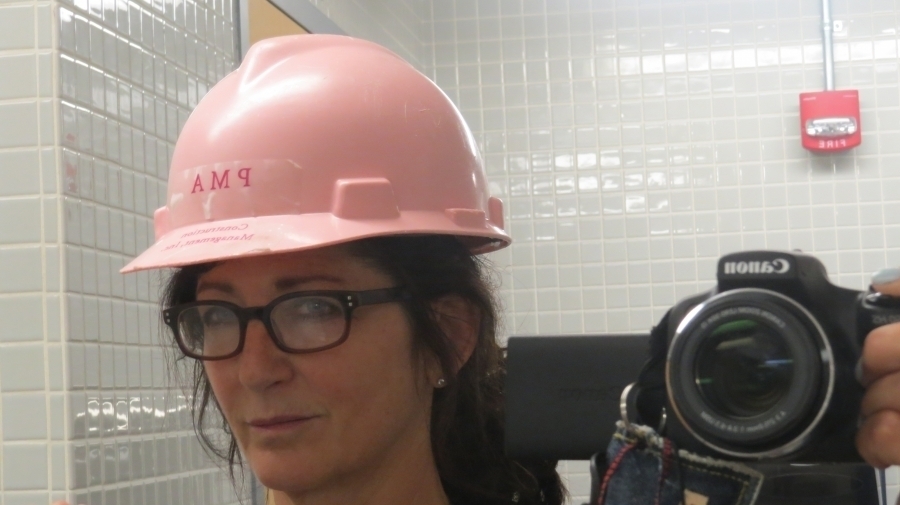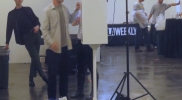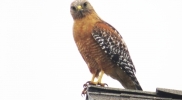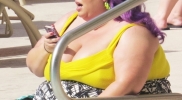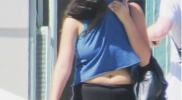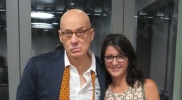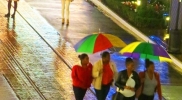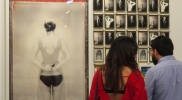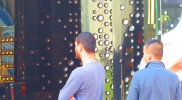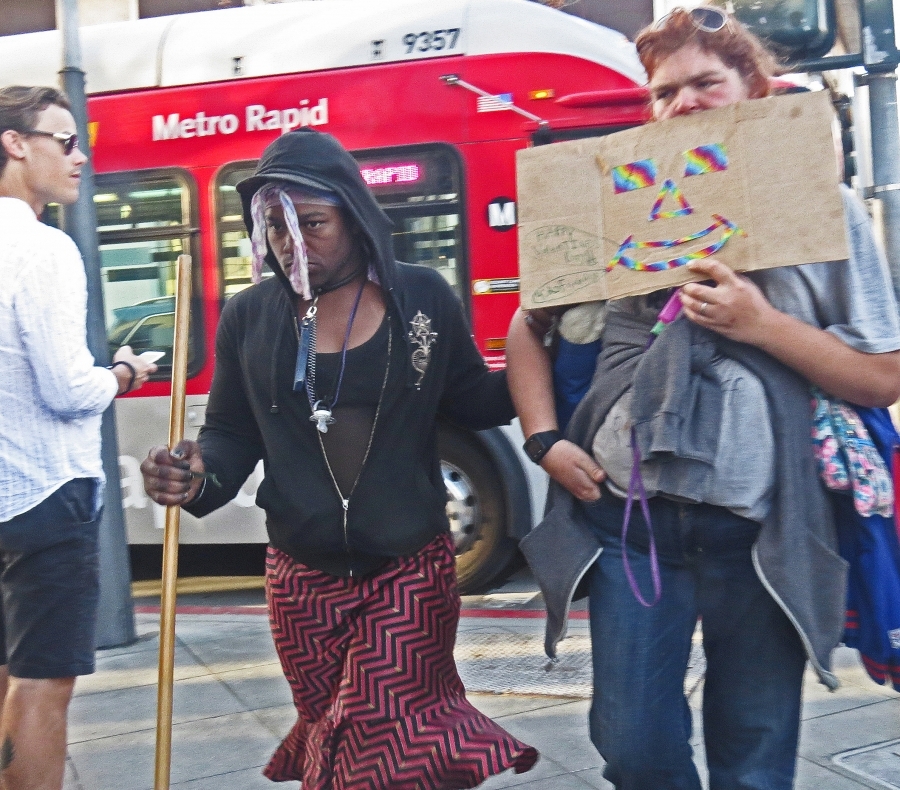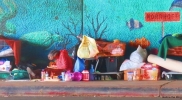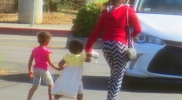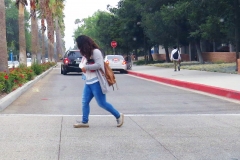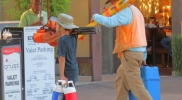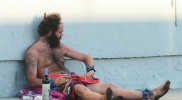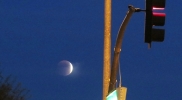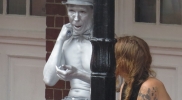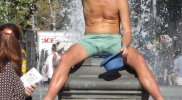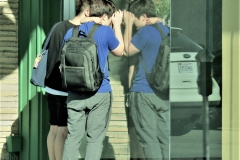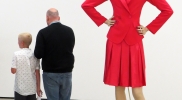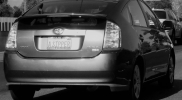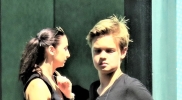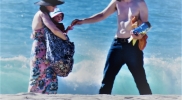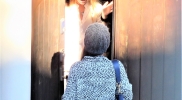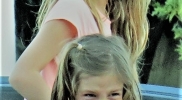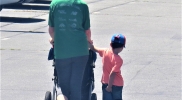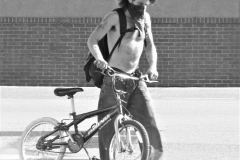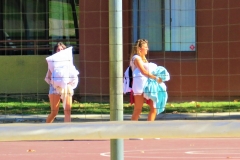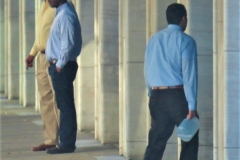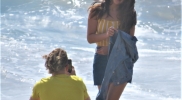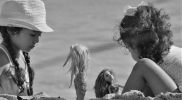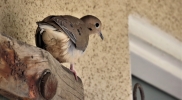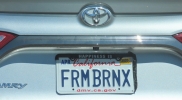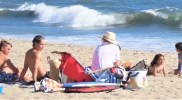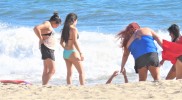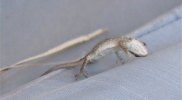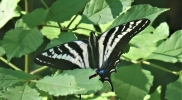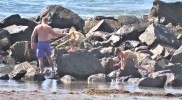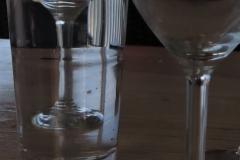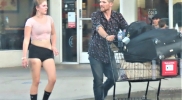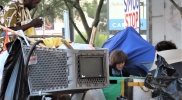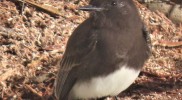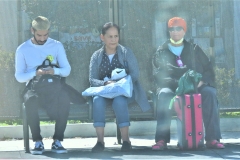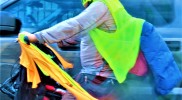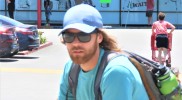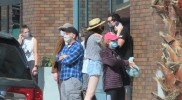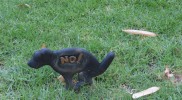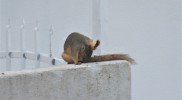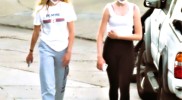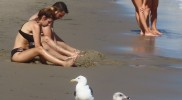|
|
Best Poems - Birds
Best Poems – ANIMALS
|
|
|
| The Nightingale – R. Barnefield
“As it fell upon a day
In the merry month of May,
Sitting in a pleasant shade
Which a grove of myrtles made,
Beasts did leap and birds did sing,
Trees did grow and plants did spring;
Every thing did banish moan
Save the Nightingale alone.
She, poor bird, as all forlorn,
Lean’d her breast against a thorn,
And there sung the dolefull’st ditty
That to hear it was great pity.
Fie fie, fie, now would she cry;
Tereu, tereu, by and by:
That to hear her so complain
Scarce I could from tears refrain;
For her griefs so lively shown
made me think upon mine own.
-Ah, thought I, thou mourn’st in vain,
None takes pity on thy pain:
Senseless trees, they cannot hear thee,
Ruthless beasts, they will not cheer thee;
King Pandion, he is dead,
All thy fellow birds do sing
Careless of thy sorrowing:
Even so, poor birds, like thee
None alive will pity me.” |
| Mercy Killing – Remica L. Bingham
“At Big Ma’s, I stood in the middle of each room,
careful not to lean on walls or too near closets,
afraid the vermin—now outnumbering
the hairs on her head—would find their way
to my purse or pockets.
When asked to go to her drawer for antacid, I hesitated
knowing I’d have to reach in amidst their dark scattering
to soother her. These are the sacrifices we make
my mother said while on the floor at Big Ma’s feet,
clipping her toenails, using a slipper
to smash roaches as they came.
My father hated the dirtiness of any place
yet knelt, in his finest charcoal suit, near the phone cord—
twisting its disconnected wires—
surely aware of the thick dust graying his elbows and knees.
Until he heard a dial-tone and Big Ma said
I can call now if I need you, he did not rise.
Hours later, in public with our private lives well-clothed,
when I saw the silvery-brown pest slip
from his pants cuff—remembering my parents’ selflessness,
their hushed mercy—I used my sharp-tipped shoes
to make a sacrifice and killed it—quite, swift—without mentioning
my fear and without his ever knowing.” |
| Beneath Me – Jericho Brown
“They were of a different hue.
They were all the same color.
The roaches at 51 Felton Street
Went to work when we snored.
They raced for black lines
At the flick of a switch.
They were an athletic sort.
Some of their youngest laughed
At my Chuck Taylor’s,
And I just knew
I’d never make it to the Olympics.
Sleep and they’d creep
Into my ears come night.
They conspired with certain spiders
Regarding ladder and crane designs.
Anything to top the refrigerator,
For the loaf of white bread.
They did not fly
Because they chose not to.
They would not sing
Above a roach whisper.
The Roaches on Felton ruled
The cabinets, the land
Of pots and plates and pans.
They were well-dress and polite.
We sneezed. They said
Bless you. They coughed.
We slapped their shiny backs.
But I don’t have to miss them
Coursing through the walls
I come from. All that crawls
Beneath me dies
When I try my walk away.
Every time I tell a lie, I smile
And imagine their coupling, oh
God, their loveless orgies.
Insects. Incest. 674 families
Below my family’s beds.
The roaches at 51 Felton Street,
They hate my human face.
They know my last name.” |
|
|
| Another Reason Why I Don’t Keep A Gun In The House – Billy Collins
“The neighbors’ dog will not stop barking.
He is barking the same high, rhythmic bark
that he barks every time they leave the house.
They must switch him on on their way out.
The neighbors’ dog will not stop barking.
I close all the windows in the house
and put on a Beethoven symphony full blast
but I can still hear him muffled under the music,
barking, barking, barking,
and now I can see him sitting in the orchestra,
his head raised confidently as if Beethoven
had included a part for barking dog.
When the record finally ends he is still barking,
sitting there in the oboe section barking,
his eyes fixed on the conductor who is
entreating him with his baton
while the other musicians listen in respectful
silence to the famous barking dog solo,
that endless coda that first established
Beethoven as an innovative genius.” |
|
|
|
|
| The Revenant – Billy Collins
“I am the dog you put to sleep,
as you like to call the needle of oblivion,
come back to tell you this simple thing:
I never liked you—not one bit.
When I licked your face,
I thought of biting off your nose.
When I watched you toweling yourself dry,
I wanted to leap and unman you with a snap.
I resented the way you moved,
your lack of animal grace,
the way you would sit in a chair to eat,
a napkin on your lap, knife in your hand.
I would have run away,
but I was too weak, a trick you taught me
while I was learning to sit and heel,
and—greatest of insults—shake hands without a hand.
I admit the sight of the leash
would excite me
but only because it meant I was about
to smell things you had never touched.
You do not want to believe this,
but I have no reason to lie.
I hated the car, the rubber toys,
disliked your friends and, worse, your relatives.
The jingling of my tags drove me mad.
You always scratched me in the wrong place.
All I ever wanted from you
was food and fresh water in my metal bowls.
While you slept, I watched you breathe
as the moon rose in the sky.
It took all of my strength
not to raise my head and howl.
Now I am free of the collar,
the yellow raincoat, monogrammed sweater,
the absurdity of your lawn,
and that is all you need to know about this place
except what you already supposed
and are glad it did not happen sooner—
that everyone here can read and write,
the dogs in poetry, the cats and the others in prose.”
|
|
|
The Container – Cid Corman
“I found a
hummingbird
on the sill
by the books
before the hollyhocks
dying. I
urged the beak
a drop but
its breath had
migrated.
What remained
made of my
palm a nest
for the dead.” |
| Like A Cat – Laura Cronk
“You want a dog
but you are like a cat,
though you hate cats,
which is a very catlike
position. I want a cat
but you’re allergic
so we’ll get a dog
who will be like me.
Besides, I realize that,
having you, I already
have a cat. You have
intense fixations, like
a cat. Though you’re
tall and strong, you walk
lightly on the balls
of your feet, like a cat.
You’re good at
everything you ever
try to do. In your
reticence you’d rather
not be written about or
analyzed, like a cat.
But you are very good
to look at, to study,
in your many moods
and attitudes, like a cat.
And your affection
is sudden and real,
radiating mystery
and heat beside me,
like a cat. |
|
|
The Humble-Bee – Ralph Waldo Emerson
“BURLY, dozing humblebee!
Where thou art is clime for me.
Let them sail for Porto Rique,
Far-off heats through seas to seek;
I will follow thee alone,
Thou animated torrid zone!
Zig-zag steerer, desert-cheerer,
Let me chase thy waving lines;
Keep me nearer, me thy hearer,
Singing over shrubs and vines.
Insect lover of the sun,
Joy of thy dominion!
Sailor of the atmosphere;
Swimmer through the waves of air;
Voyager of light and noon;
Epicurean of June;
Wait I prithee, till I come
Within ear-shot of thy hum,—
All without is martyrdom.
When the south wind, in May days,
With a net of shining haze,
Silvers the horizon wall,
And, with softness touching all,
Tints the human countenance
With a color of romance,
And infusing subtle heats,
Turns the sod to violets,
Thou in sunny solitudes,
Rover of the underwoods,
The green silence dost displace,
With thy mellow breezy bass.
Hot midsummer’s petted crone,
Sweet to me thy drowsy tune,
Tells of countless sunny hours,
Long days, and solid banks of flowers;
Of gulfs of sweetness without bound
In Indian wildernesses found;
Of Syrian peace, immortal leisure,
Firmest cheer, and bird-like pleasure.
Aught unsavory or unclean
Hath my insect never seen;
But violets and bilberry bells,
Maple sap and daffodels,
Grass with green flag half-mast high,
Succory to match the sky,
Columbine with horn of honey,
Scented fern, and agrimony,
Clover, catchfly, adder’s-tongue
And brier-roses, dwelt among;
All beside was unknown waste,
All was picture as he passed.
Wiser far than human seer,
Yellow-breeched philosopher!
Seeing only what is fair,
Sipping only what is sweet,
Thou dost mock at fate and care,
Leave the chaff, and take the wheat,
When the fierce northwestern blast
Cools sea and land so far and fast,
Thou already slumberest deep;
Woe and want thou canst outsleep;
Want and woe which torture us,
Thy sleep makes ridiculous.” |
| Cats – Eleanor Farjeon
“Cats sleep
Anywhere,
Any table,
Any chair,
Top of piano,
Window-ledge,
In the middle,
On the edge,
Open drawer,
Empty shoe,
Anybody’s
Lap will do,
Fitted in a
Cardboard box,
In the cupboard
With your frocks—
Anywhere!
They don’t care!
Cats sleep
Anywhere.” |
|
|
| The Dinkey-Bird – Eugene Field
In an ocean, ‘way out yonder
(As all sapient people know)
Is the land of Wonder-wander,
Whither children love to go:
It’s their playing, romping, swinging,
That give great joy to me
While the Dinkey-Bird goes singing
In the amfalula tree!
There the gum-drops grow like cherries,
And taffy’s thick as peas—
Caramels you pick like berries
When, and where, and how you please;
Big red sugar-plums are clinging
To the cliffs beside that sea
Where the Dinkey-Bird is singing
In the amfalula tree
So when children shout and scamper
And make merry all the day,
When there’s naught to put a damper
To the ardor of their play;
When I hear their laughter ringing,
Then I’m sure as sure can be
That the Dinkey-Bird is singing
In the amfalula tree
For the Dinkey-Bird’s bravuras
And staccatos are so sweet—
His roulades, apoggiaturas,
And robustos so complete,
That the youth of every nation—
Be they near or far away—
Have especial delectation
In that gladsome roundelay.
Their eyes grow bright and brighter,
Their lungs begin to crow,
Their hearts get light and lighter,
And their cheeks are all aglow;
For an echo cometh bringing
The news to all and me,
That the Dinkey-Bird is singing
In the amfalula tree.
I’m sure you like to go there
To see your feathered friend,—
And so many goodies grow there
You would like to comprehend!
Speed, little dreams, your winging
To that land across the sea
Where the Dinkey-Bird is singing
In the amfalula tree! |
|
|
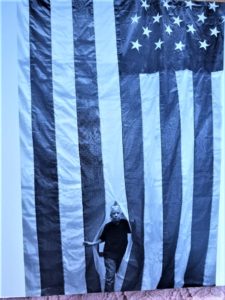
Nikki Giovanni, photo by B.A. Van Sise (Children of Grass: A Portrait of American Poetry)
Allowables – Nikki Giovanni
“I killed a spider
Not a murderous brown recluse
Nor even a black widow
And if the truth were told this
Was only a small
Sort of papery spider
Who should have run
When I picked up the book
But she didn’t
And she scared me
And I smashed her
I don’t think
I’m allowed
To kill something
Because I am
Frightened” |
|
|
| Dog-grel Verses, By A Poor Blind – Thomas Hood
“Oh what shall I do for a dog?
Of sight I have not got a particle,
Globe, Standard, or Sun,
Times, Chronicle—none
Can give me a good leading article.
A Mastiff once led me about,
But people appear’d so to fear him—
I might have got pence
Without his defense,
But charity would not come near him.
A blood-hound was not much amiss,
But instinct at last got the upper;
And tracking Bill Soames,
And thieves to their homes,
I never could get home to supper.
A fox-hound once served me as guide,
A good one at hill and at valley;
But day after day
He led me astray,
To follow a milk-woman’s tally.
A Turnspit once did me good turns
At going, and crossing, and stopping;
Till one day his breed
Went off at full speed,
To spit at a great fire in Wapping
A Pointer once pointed my way,
But did not turn out quite so pleasant;
Each hour I’d a stop
At a Poulterer’s shop
To point at a very high pheasant.
A Pug did not suit me at all,
The feature unluckily rose up;
And folks took offence
When offering pence,
Because of his turning his nose up.
A Butcher once gave me a dog,
That turn’d out the worst one of any;
A Bull dog’s own pup,
I got a toss up,
Before he had brought me a penny.
My next was a Westminster dog,
From Aistrop the regular cadger;
But, sightless, I saw
He never would draw
A blind man so well as a badger.
A Greyhound I got by a swop,
But, Lord! we soon came to divorces;
He treated my strip
Of cord like a slip,
And left me to go my own courses.
My next was a Newfoundland brute,
As big as a calf fit for slaughter;
But my old cataract
So truly he back’d
I always fell into the water.
I once had a sheep-dog for guide,
His worth did not value a button;
I found it no go,
A Smithfield Ducrow,
To stand on four saddles of mutton.
My next was an Esquimaux dog,
A dog that my bones ache to talk on,
For picking his ways
On cold frosty days
He pick’d out the slides for a walk-on.
Bijou was a lady-like dog,
But vex’d me at night not a little,
When tea-time was come
She would not go home,
Her tail had once trail’d a tin kettle.
I once had a sort of a Shock,
And kiss’d a street post like a brother,
And lost every tooth
In learning this truth—
One blind cannot well lead another.
A Terrier was far from a trump,
He had one defect, and a thorough,
I never could stir,
‘Od rabbit the cur!
Without going into the Borough.
My next was Dalmatian, the dog!
And let me in danger, oh crikey!
By chasing horse heels
Between carriage wheels
Till I come upon boards that were spiky.
The next that I had was from Cross,
And once was a favourite Spaniel
With Nero, now dead,
And so I was led
Right up to his den, like a Daniel
A Mongrel I tried, and he did,
As far as the profit and lossing,
Except that the kind
Endangers the blind,
The breed is so fond of a crossing.
A Setter was quite to my taste,
In alleys or streets broad or narrow,
Till one day I met
A very dead set,
At a very dead horse in a barrow.
I once had a dog that went mad,
And sorry I was that I got him;
It came to a run,
And a man with a gun
Pepper’d me when he ought to have shot him.
My profits have gone to the dogs,
My trade has been such a deceiver,
I fear that my aim
Is a mere loosing game,
Unless I can find a Retriever.” |
|
|
| The Drowning Ducks – Thomas Hood
“Amongst the sights that Mrs. Bond
Enjoyed yet grieved at more than others,
Were little ducklings in a pond,
Swimming about beside their mothers—
Small things like living water-lilies,
But yellow as the daffo-dillies.
‘It’s very hard,’ she used to moan,
‘That other people have their ducklings
To grace their waters—mine alone
Have never any pretty chucklings.’
For why!—each little yellow navy
Went down—all downy—to old Davy!
She had a lake—a pond, I mean—
Its wave was rather thick than pearly—
She had two ducks, their napes were green—
She had a drake, his tail was curly,—
Yet spite of drake, and ducks, and pond,
No little ducks had Mrs. Bond!
The birds were both the best of mothers—
The nests had eggs—the eggs had luck—
The infant D’s came forth like others—
But there, alas! the matter stuck!
They might as well have all died addle
As die when they began to paddle!
For when, as native instinct taught her,
The mother set her brood afloat,
They sank ere long right under water,
Like any overloaded boat;
They were web-footed too to see,
As ducks and spiders ought to be!
No peccant humor in a gander
Brought havoc on her little folks,—
No poaching cook—a frying pander
To appetite,—destroyed their yolks,—
Beneath her very eyes, Od rot ’em!
They went, like plummets, to the bottom.
The thing was strange—a contradiction
It seem’d of nature and her works!
For little ducks, beyond conviction,
Should float without the help of corks:
Great Johnson, it bewildered him!
To hear of ducks that could not swim.
Poor Mrs. Bond! what could she do
But change the breed—and she tried divers
Which dived as all seemed born to do;
No little ones were e’er survivors—
Like those that copy gems, I’m thinking,
They all were given to die-sinking!
In vain their downy coats were shorn;
They floundered still!—Batch after batch went!
The little fools seemed only born
And hatched for nothing but a hatchment!
Whene’er they launched—oh, sight of wonder!
Like fires the water ‘got them under.’
No woman ever gave their lucks
A better chance than Mrs. Bond did;
At last quite out of heart and ducks,
She gave her pond up, and desponded;
For Death among the water-lilies,
Cried “Duc ad me” to all her dillies!
But though resolved to breed no more,
She brooded often on this riddle—
Alas! ’twas darker than before!
At last about the summer’s middle,
What Johnson, Mrs. Bond, or none did,
To clear the matter up the Sun did!
The thirsty Sirius dog-like drank
So deep, his furious tongue to cool,
The shallow waters sank and sank,
And lo, from out the wasted pool,
Too hot to hold them any longer,
There crawled some eels as big as conger!
I wish all folks would look a bit,
In such a case below the surface;
And when the eels were caught and split
By Mrs. Bond, just think of her face,
In each inside at once to spy
A duckling turned to giblet-pie!
The sight at once explained the case,
Making the Dame look rather silly:
The tenants of that Eely Place
Had found the way to Pick a dilly,
And so, by under-water suction,
Had wrought the little ducks’ abduction.” |
|
|
| The Cat – Ted Hughes
“You need your Cat.
When you slump down
All tired and flat
With too much town
With too many lifts
Too many floors
Too many neon-lit
Corridors
Too many people
Telling you what
You just must do
And what you must not
With too much headache
Video glow
Too many answers
You will never know
Then stroke the Cat
That warms your knee
You’ll find her purr
Is a battery
For into your hands
Will flow the powers
Of the beast who ignore
These ways of ours
And you’ll be refreshed
Through the Cat on your lap
With a Leopard’s yawn
And a Tiger’s nap.”
|
| Ants – Vicki Hudspith
“Ants are not fond of margarine. Like us they prefer
Butter. They do not have cholesterol problems
Because as yet they do not own TVs. For centuries
They have toiled in order that they might be able to
Take a night off and watch the Northern Lights which
Are their version of canned laughter. They hate picnics
But feel compelled by folklore to attend them
Or at minimum do a drive by chicken leg grab. Their
Queen is a pain in the ass. They don’t love her but
Without her they would be common, so they serve her.
She is an insatiable nymphomaniac but they don’t
Hold that against her trying instead to stay busy with work.
Forgotten ancient languages have been genetically
Imprinted in them at birth and they say things they
Don’t understand. Like us they often make bad marriages.
But because of their outstanding physical prowess
And humility there is seldom cause for divorce. They
Haven’t read the great philosophers but they know them
Innately. They love the flowers of Spring and lacking
Perspective eagerly run all over them. They
Are much like us. They are nudists but because Puritanism
Has not invaded their genetic code, it does not
Affect their work ethic and each ant loves its own body.
Therefore they don’t care about go-go boots and
Sandals. Like us, Ants are driven by their hearts and pretend
That it is all in the name of duty. Ants are never impulsive.
When they laugh, the gardens of old maids tremble. Ants
Love to dance but lack a sense of rhythm so
They gave it up when Homer scorned them. Rain is their
Sensuality. It makes them feel delirious and late. Quivering
And running between rain drops to their fate.” |
|
|
| Song of the New Chinese – Jack Kerouac
[Part I]
“The Moose is a noble dolt.
The Elk is a fool.
The Rhinoceros is the biggest bore of them all.
The Hippopotamus is a Giant River Pig.
The Hyena is a striped dog who thought he was a Laughing Horse.
The Lion is a Queer Cat who by the power of his Queerness became a great Jowled Cat.
The Tiger is a pure cat.
The Panther hates cats.
The Cheetah is a dog who thought he was a Fast Cat.
The Giraffe is a Horse who grew fond of Tree-Top Leaves.
The Snake has a body beautiful,
And the Elephant is the Lord,
the Hook & Curl of his trunk,
the long-lashéd Eye.
The Sloth is a Chinese Poet upsidedown.
The Ant-Eater is a long-nosed investigator of Villages.
The Scorpion is a Sea-Spider trapped on land.
The Whale is More so.
The Man is very strange.
[Part II]
The Spider monkey is a little fool.
The Pekinese Doll is a dog.
The Dachshund is a snake full of Love.
The Siamese Cat is an Angry Monkey.
The Woman is a cellular mesh of lies as well as a Scratcher.
The Woman has a dark blossom between her Thighs.
The Buddha is Known.
The Messiah is Unborn.
The Boll Weevil is a pants rotter.
The ant a Warrior.
The worm is a long history oozing out of Who?
Who!
Mu!
Wu!
The dog is a god.
The dog is a balker.
The Leopard is Incontinent, said Dante, free from the Severity of Leopard
The Angel Rules the Jungle.
Blake is Blake.
The Cow has its own way with water.
And the Tick sticks in your hair & swells—
The Shark I never Saw
The purple ass baboon is Insane
The Sparrow is a little grey bird
The Chimpanzee is Wise
The American a Sniper
The Gull a bringer of Snail Shells
The Parrot I love
The snail knows the Unborn Void of Tao and that’s why he left his house for Gull
The Sea Bird is all Belly
Crows are Dawn Singers
The Bee hums busily
The Frog leaped out of Water
The Abominable Snowman is not abominable at all, he doesn’t hurt anybody—
The Rat has many theories—
The Spider means money—
The Fly has Seven Million brothers—
The Seal is on my Roof
The Goose goes north
The Robin wins the spring
The caterpillar waits
The Nightingale I have been
The mockingbird loves TV aerials
The Rabbit
The vulture trails the Puma
The wolf snaps the Bear
The Lizard
The Eeel
The Octopus
The Tapeworm
The Finger
The Cock
The Germ
The Fingernail
The Wall
The Swordfish has a Beak of Wood
The Lobster is friendly.
The flea leaps,
The Cockroach is Reverenced,
The Bedbug rolls.” |
|
| Ode To The Cat – Pablo Neruda (trans. by John Hollander)
“The animals were imperfect,
long of tail,
sorrowful of head.
Little by little they got adjusted,
made landscape,
acquired spots, graces, flight.
The cat only,
the cat appeared complete
and proud:
born fully finished
he walked by himself and knew what he wanted.
Man wants to be fish and bird,
the serpent had wanted wings,
the dog is a displaced lion,
the engineer wants to be a poet,
the fly studies how to be a swallow,
the poet tries to imitate flies,
but the cat
wants only to be a cat
and every cat is cat
from whiskers to tail,
from presentiment to living rat,
from the night right up to his golden eyes.
Nothing has
his unity,
nothing lunar or floral
has such a texture:
he is one whole
like the sun or the topaz,
and the springing curve of his contour
firm and subtle as
the line of a ship’s prow.
His yellow eyes
leave a single slot
through which the coins of night drop.
Oh little
emperor without a realm,
conquistador without a country,
smallest tiger in the salon,
and nuptial sultan of the heaven
of erotic housetops.
Love’s wind you claim
in the wild weather
when you pass
and place
four feet, delicate,
on the ground,
sniffing,
distrusting the whole universe
as if it all were too dirty
for a cat’s immaculate foot.
Oh proud Independent of the house,
haughty remnant of night
lazy, athletic
and alien,
profoundest cat,
secret police
of the dwellings
flag
of a vanished velvet,
surely there is no enigma
in your manner,
perhaps no mystery,
the whole world knows you and you belong
to the least mysterious of householders
perhaps all feel that, all who feel themselves owners,
masters, uncles
of cats, companions, colleagues,
students or friends
of the cat.
I don’t—
I don’t buy that,
I don’t understand cats.
All these I know: life and its archipelago,
the sea and the unmeasurable city,
botany—
the pistil and its deviations,
the for and the minus of mathematics,
the world’s volcanic funnels,
the crocodile’s unreal rind,
the fireman’s unknowable goodness,
yet I cannot decipher a cat.
My understanding slips on his indifference,
his eyes hold golden numbers.”
|
| If I Were A Bird – Lorine Niedecker
“I’d be a dainty contained cool
Greek figurette
on a morning shore—
H.D.
I’d flitter and feed and delouse myself
close to Williams’ house
and his kind eyes
I’d be a never-museumed tinted glass
breakable from the shelves of Marianne Moore.
On Stevens’ fictive sibilant hibiscus flower
I’d poise myself, a cuckoo flamingo-pink.
I’d plunge the depths with Zukofsky
and all that means—stirred earth,
cut sky, organ-sounding, resounding
anew, anew.
I’d prick the sand in cunning, lean,
Cummings irony, a little drunk dead sober.
Man, that walk down the beach!
I’d sit on a quiet fence
and sing a quiet thing: sincere, sincere.
And that would be Reznikoff.” |
| Flamingos – Eric Ormsby
“My quarrel with your quorum, Monsignor
Flamingo, is that you scant the rubicund
in favor of a fatal petal
tint. I would rather bask
in riots of the roseate
than measure your footfalls’
holy protocols beside the head-
board of a drowsy demiurge.
I think God snores in rose
leaves of serenity, not in your
clatter of cadaverous vermeils.
I find flamingos beautiful Tartuffes
who entice as they distance me.
When they display their billiarding,
adolescent sprawl of knees I
remember the parochial
school girls in pink cashmeres, their rosy
kneecaps polished by novenas.
Flamingo have the silhouettes
of parking meters. They have no epaulettes
and yet seem always in uniform—
little, stilted caudillos! They swarm
in unruffled ripples of defiling pink.
They mimic ballerinas and yet stink.
Flamingos are dirty in their purity,
blazon Venezuelas of lewd suavity.
Beneath their transcendent, backbent
legs flamingos are somnolent
and lubricious birds whose stiff tutus
amuse
the spoonbills and anhingas who erect
nests of fish skin to reflect
the imperial smut of the sky.
I feel a samba roll
under my eyelids when flamingos stroll
oceanward at sundown and clap their stubs of wings
in gawky, rank, hierophantic posturings.
When the Lord God created the flamingos, He
fell into despondency. He knew
that roseate feathers on such skeletons
elicit incredulity He gloomed
for days, obsessive as a poet who
discovers a covert love affair between
obstreperous syllables and then,
cracking grandeur from the egg of shame,
sets these
diametric desperadoes in a pas de deux.
Only in Miami is supreme
loneliness apparent in flamingo dawn.
The squalor of the place is cruelly pink.
There are pink curtains on the lousy shacks.
The impulse to adorn deepens the nakedness.
There, flamingos all the color of a bone
scavenge in vermillion stateliness.
Their pink flocks forage in that loneliness.” |
|
Inventing A Horse – Meghan O’Rourke
“Inventing a horse is not easy.
One must not only think of the horse.
One must dig fence posts around him.
One must include a place where horses like to live;
or do when they live with humans like you.
Slowly, you must walk him in the cold;
feed him bran mash, apples;
accustom him to the harness;
holding in mind even when you are tired
harnesses and tack cloths and saddle oil
to keep the saddle clean as a face in the sun;
one must imagine teaching him to run
among the knuckles of tree roots,
not to be skittish at first sight of timber wolves,
and not to grow thin in the city,
where at some point you will have to live;
and one must imagine the absence of money.
Most of all, though: the living weight,
the sound of his feet on the needles,
and, since he is heavy, and real,
and sometimes tired after a run
down the river with a light whip at his side,
one must imagine love
in the mind that does not know love,
an animal mind, a love that does not depend
on your image of it,
your understanding of it;
indifferent to all that it lacks:
a muzzle and two black eyes
looking the day away, a field empty
of everything but witch grass, fluent trees,
and some piles of hay.”
|
|
|
The Raven – Edgar Allan Poe
“Once upon a midnight dreary, while I pondered, weak and weary,
Over many a quaint and curious volume of forgotten lore—
While I nodded, nearly napping, suddenly there came a tapping,
As of some one gently rapping, rapping at my chamber door.
“’Tis some visitor,” I muttered, “tapping at my chamber door—
Only this and nothing more.”
Ah, distinctly I remember it was in the bleak December;
And each separate dying ember wrought its ghost upon the floor.
Eagerly I wished the morrow;—vainly I had sought to borrow
From my books surcease of sorrow—sorrow for the lost Lenore—
For the rare and radiant maiden whom the angels name Lenore—
Nameless here for evermore.
And the silken, sad, uncertain rustling of each purple curtain
Thrilled me—filled me with fantastic terrors never felt before;
So that now, to still the beating of my heart, I stood repeating
“’Tis some visitor entreating entrance at my chamber door—
Some late visitor entreating entrance at my chamber door;—
This it is and nothing more.”
Presently my soul grew stronger; hesitating no longer
“Sir,” said I, “or Madam, truly your forgiveness I implore;
But the fact is I was napping, and so gently you came rapping,
And so faintly you came tapping, tapping at my chamber door,
That I scarce was sure I heard you”—here I opened wide the door;—
Darkness there and nothing more.
Deep into that darkness peering, long I stood there wondering, fearing,
Doubting, dreaming dreams no mortal ever dared to dream before;
But the silence was unbroken, and the stillness gave no token,
And the only word there spoken was the whispered word, “Lenore?”
This I whispered, and an echo murmured back the word, “Lenore!”—
Merely this and nothing more.
Back into the chamber turning, all my soul within me burning,
Soon again I heard a tapping somewhat louder than before.
“Surely,” said I, “surely that is something at my window lattice;
Let me see, then, what thereat is, and this mystery explore—
Let my heart be still a moment and this mystery explore;—
’Tis the wind and nothing more!”
Open here I flung the shutter, when, with many a flirt and flutter,
In there stepped a stately Raven of the saintly days of yore;
Not the least obeisance made he; not a minute stopped or stayed he;
But, with mien of lord or lady, perched above my chamber door—
Perched upon a bust of Pallas just above my chamber door—
Perched, and sat, and nothing more.
Then this ebony bird beguiling my sad fancy into smiling,
By the grave and stern decorum of the countenance it wore,
“Though thy crest be shorn and shaven, thou,” I said, “art sure no craven,
Ghastly grim and ancient Raven wandering from the Nightly shore—
Tell me what thy lordly name is on the Night’s Plutonian shore!”
Quoth the Raven “Nevermore.”
Much I marvelled this ungainly fowl to hear discourse so plainly,
Though its answer little meaning—little relevancy bore;
For we cannot help agreeing that no living human being
Ever yet was blessed with seeing bird above his chamber door—
Bird or beast upon the sculptured bust above his chamber door,
With such name as “Nevermore.”
But the Raven, sitting lonely on the placid bust, spoke only
That one word, as if his soul in that one word he did outpour.
Nothing farther then he uttered—not a feather then he fluttered—
Till I scarcely more than muttered “Other friends have flown before—
On the morrow he will leave me, as my Hopes have flown before.”
Then the bird said “Nevermore.”
Startled at the stillness broken by reply so aptly spoken,
“Doubtless,” said I, “what it utters is its only stock and store
Caught from some unhappy master whom unmerciful Disaster
Followed fast and followed faster till his songs one burden bore—
Till the dirges of his Hope that melancholy burden bore
Of ‘Never—nevermore’.”
But the Raven still beguiling all my fancy into smiling,
Straight I wheeled a cushioned seat in front of bird, and bust and door;
Then, upon the velvet sinking, I betook myself to linking
Fancy unto fancy, thinking what this ominous bird of yore—
What this grim, ungainly, ghastly, gaunt, and ominous bird of yore
Meant in croaking “Nevermore.”
This I sat engaged in guessing, but no syllable expressing
To the fowl whose fiery eyes now burned into my bosom’s core;
This and more I sat divining, with my head at ease reclining
On the cushion’s velvet lining that the lamp-light gloated o’er,
But whose velvet-violet lining with the lamp-light gloating o’er,
She shall press, ah, nevermore!
Then, methought, the air grew denser, perfumed from an unseen censer
Swung by Seraphim whose foot-falls tinkled on the tufted floor.
“Wretch,” I cried, “thy God hath lent thee—by these angels he hath sent thee
Respite—respite and nepenthe from thy memories of Lenore;
Quaff, oh quaff this kind nepenthe and forget this lost Lenore!”
Quoth the Raven “Nevermore.”
“Prophet!” said I, “thing of evil!—prophet still, if bird or devil!—
Whether Tempter sent, or whether tempest tossed thee here ashore,
Desolate yet all undaunted, on this desert land enchanted—
On this home by Horror haunted—tell me truly, I implore—
Is there—is there balm in Gilead?—tell me—tell me, I implore!”
Quoth the Raven “Nevermore.”
“Prophet!” said I, “thing of evil!—prophet still, if bird or devil!
By that Heaven that bends above us—by that God we both adore—
Tell this soul with sorrow laden if, within the distant Aidenn,
It shall clasp a sainted maiden whom the angels name Lenore—
Clasp a rare and radiant maiden whom the angels name Lenore.”
Quoth the Raven “Nevermore.”
“Be that word our sign of parting, bird or fiend!” I shrieked, upstarting—
“Get thee back into the tempest and the Night’s Plutonian shore!
Leave no black plume as a token of that lie thy soul hath spoken!
Leave my loneliness unbroken!—quit the bust above my door!
Take thy beak from out my heart, and take thy form from off my door!”
Quoth the Raven “Nevermore.”
And the Raven, never flitting, still is sitting, still is sitting
On the pallid bust of Pallas just above my chamber door;
And his eyes have all the seeming of a demon’s that is dreaming,
And the lamp-light o’er him streaming throws his shadow on the floor;
And my soul from out that shadow that lies floating on the floor
Shall be lifted—nevermore!”
|
|
|
|
Freaks of Fashion – Christina Rossetti
“Such a hubbub in the nests,
Such a bustle and squeak!
Nestlings, guiltless of a feather,
Learning just to speak,
Ask—’And how about the fashions?’
From a cavernous beak.
Perched on bushes, perched on hedges,
Perched on firm hahas,
Perched on anything that holds them,
Gay papas and grave mammas
Teach the knowledge-thirsty nestlings:
Hear the gay papas.
Robin says: ‘A scarlet waistcoat
Will be all the wear,
Snug, and also cheerful-looking
For the frostiest air,
Comfortable for the chest too
When one comes to plume and pair.’
‘Neat gray hoods will be in vogue,’
Quoth a Jackdaw: ‘Glossy gray,
Setting close, yet setting easy,
Nothing fly-away;
Suited to our misty mornings,
A la negligee.’
Flushing salmon, flushing sulphur,
Haughty Cockatoos
Answer—’Hoods may do for mornings,
But for evenings choose
High head-dresses, curved like crescents,
Such as well-bred persons use.’
‘Top-knots, yes; yet more essential
Still, a train or tail,’
Screamed the Peacock: ‘Gemmed and lustrous
Not too stiff, and not too frail;
Those are best which rearrange as
Fans, and spread or trail.’
Spoke the Swan, entrenched behind
An inimitable neck:
‘After all, there’s nothing sweeter
For the lawn or lake
Than simple white, if fine and flaky
And absolutely free from speck.’
‘Yellow,’ hinted a Canary,
‘Warmer, not less distingué.’
‘Peach color,’ put in a Lory,
‘Cannot look outre.’
‘All the colors are in fashion,
And are right,’ the Parrots say.
‘Very well. But do contrast
Tints harmonious,’
Piped a Blackbird, justly proud
Of bill aurigerous;
‘Half the world may learn a lesson
As to that from us.’
Then a Stork took up the word:
‘Aim at height and chic:
Not high heels, they’re common; somehow,
Stilted legs, not thick,
Nor yet thin:’ he just glanced downward
And snapped to his beak.
Here a rustling and a whirring,
As of fans outspread,
Hinted that mammas felt anxious
Lest the next thing said
Might prove less than quite judicious,
Or even underbred.
So a mother Auk resumed
The broken thread of speech:
‘Let colors sort themselves, my dears,
Yellow, or red, or peach;
The main points, as it seems to me,
We mothers have to teach,
‘Are form and texture, elegance,
An air reserved, sublime;
The mode of wearing what we wear
With due regard to month and clime.
But now, let’s all compose ourselves,
It’s almost breakfast-time.’
A hubbub, a squeak, a bustle!
Who cares to chatter or sing
With delightful breakfast coming?
Yet they whisper under the wing:
‘So we may wear whatever we like,
Anything, everything!'”
|
|
|
To A Skylark – Percy Bysshe Shelley
“Hail to thee, blithe Spirit!
Bird thou never wert,
That from Heaven, or near it,
Pourest thy full heart
In profuse strains of unpremeditated art.
Higher still and higher
From the earth thou springest,
Like a cloud of fire,
The blue deep thou wingest,
And singing still dost soar, and soaring ever singest.
In the golden lightning
Of the sunken sun
O’er which clouds are brightening,
Thou dost float and run,
Like an unbodied joy whose race is just begun.
The pale purple even
Melts around thy flight;
Like a star of Heaven
In the broad daylight
Thou art unseen, but yet I hear thy shrill delight:
Keen as are the arrows
Of that silver sphere,
Whose intense lamp narrows
In the white dawn clear
Until we hardly see, we feel that it is there.
All the earth and air
With thy voice is loud,
As, when night is bare,
From one lonely cloud
The moon rains out her beams, and Heaven is overflowed.
What thou art we know not;
What is most like thee?
From rainbow clouds there flow not
Drops so bright to see,
As from thy presence showers a rain of melody.
Like a Poet hidden
In the light of thought,
Singing hymns unbidden,
Till the world is wrought
To sympathy with hopes and fears it heeded not:
Like a high-born maiden
In a palace tower,
Soothing her love-laden
Soul in secret hour
With music sweet as love, which overflows her bower:
Like a glow-worm golden
In a dell of dew,
Scattering unbeholden
Its aerial hue
Among the flowers and grass, which screen it from the view:
Like a rose embower’d
In its own green leaves,
By warm winds deflower’d,
Till the scent it gives
Makes faint with too much sweet those heavy-wingèd thieves:
Sound of vernal showers
On the twinkling grass,
Rain-awaken’d flowers,
All that ever was
Joyous, and clear, and fresh, thy music doth surpass.
Teach us, sprite or bird,
What sweet thoughts are thine:
I have never heard
Praise of love or wine
That panted forth a flood of rapture so divine.
Chorus hymneal,
Or triumphant chaunt,
Match’d with thine, would be all
But an empty vaunt—
A thing wherein we feel there is some hidden want.
What objects are the fountains
Of thy happy strain?
What fields, or waves, or mountains?
What shapes of sky or plain?
What love of thine own kind? what ignorance of pain?
With thy clear keen joyance
Languor cannot be:
Shadow of annoyance
Never came near thee:
Thou lovest: but ne’er knew love’s sad satiety.
Waking or asleep,
Thou of death must deem
Things more true and deep
Than we mortals dream,
Or how could thy notes flow in such a crystal stream?
We look before and after,
And pine for what is not:
Our sincerest laughter
With some pain is fraught;
Our sweetest songs are those that tell of saddest thought.
Yet if we could scorn
Hate, and pride, and fear;
If we were things born
Not to shed a tear,
I know not how thy joy we ever should come near.
Better than all measures
Of delightful sound,
Better than all treasures
That in books are found,
Thy skill to poet were, thou scorner of the ground!
Teach me half the gladness
That thy brain must know,
Such harmonious madness
From my lips would flow
The world should listen then, as I am listening now!”
|
If I Were A Bird – Manuroop Singh
“If I were a bird,
Would chirp sweet words,
Fly high in the sky,
Say the world below, bye bye.
I would just fly and fly,
Eat little seeds and try,
To build a nest of my own,
And give little chicks, a home.
I would sit on a branch,
And sing melodious chants,
After mesmerizing everyone,
I would have actually won.My friends would be,
A cuckoo, a dove or a kiwi,
My enemies would be bad,
Humans, foxes and big cats.Living in a barred cage,
Would not be my fate,
To flee from human clasps,
The errand I would grasp.If I were a bird,
Would chirp sweet words,
Fly high in the sky,
Say the world below, bye bye.”
|
|
|
| Childhood – Sharan Strange
“Summer brought fireflies in swarms.
They lit our evenings like dreams
we thought we couldn’t have.
We caught them in jars, punched
holes, carried them around for days.
Luminous abdomens that when charged
with air turned bright. Imagine!
mere insects carrying such cargo,
magical caravans flickering beneath
low July skies. We chased them, amazed.
The idea! Those tiny bodies
pulsing phosphorescence.
They made reckless traffic,
signaling, neon flashes forever
into the deepening dusk.
They gave us new faith
in the nasty tonics of childhood-
pungent, murky liquids promising
shining eyes, strong teeth, glowing skin,
and we silently vowed to swallow ever after.
What was the secret of light?
We wanted their brilliance:
small fires hovering,
each tiny explosion
the birth of a new world.” |
| |
Uncle Dog: The Poet at 9 – Robert Sward
“I did not want to be old Mr.
Garbage man, but uncle dog
Who rode sitting beside him.
Uncle dog had always looked
To me to be truck-strong
Wise-eyed, a cur-like Ford Of a dog.
I did not want
To be Mr. Garbage man because
All he had was cans to do.
Uncle dog sat there me-beside-him
Emptying nothing. Barely even
Looking from garbage side to side:
Like rich people in the backseats
Of chauffeur-cars, only shaggy
In an unwagging tall-scrawny way.
Uncle dog belonged any just where
He sat, but old Mr. Garbage man
Had to stop at every single can.
I thought. I did not want to be Mr.
Everybody calls them that first.
A dog is said, Dog! Or by name.
I would rather be called Rover
Than Mr. And sit like a tough
Smart mongrel beside a garbage man.
Uncle dog always went to places
Unconcerned, without no hurry.
Independent like some leashless Toot.
Honorable among Scavenger
Can-picking dogs. And with a bitch
At every other can.
And meat:
His for the barking.
Oh, I wanted
To be uncle dog–sharp, high fox-
Eared, cur-Ford truck-faced
With his pick of the bones.
A doing, truckman’s dog
And not a simple child-dog
Nor friend to man, but an uncle
Traveling, and to himself–
And a bitch at every second can.” |
|
|
| The Prayer – James Tate
“My dog came back from the woods smelling of skunk, so
I gave him a good wash in the tub outside and things were
better. We took a walk down the street and met another dog,
a big one. They snarled at one another and then made their
peace. After a good walk we turned around and went back
home. Robbie, the dog, went to sleep in his corner, and I
did some paperwork. I was going along just fine until there
was a knock on the door. I answered it and it was my ex-wife.
She said she had come for the dog and I said that wasn’t in
the agreement. She said she had bought the dog and it was
hers. I said Robbie loved me. He said a dog doesn’t know
what love is. ‘This is the dog’s home, his neighborhood,’ I
said. ‘He’ll adapt to his new home in a day,’ she said.
‘You don’t give this dog real feelings about anything,’ I
said. ‘He’s a dog, for Christ’s sake,’ she said. ‘He’s my dog.
He comes when I call him, he sits when I tell him to, he
fetches, he sleeps when I sleep. We’re like married to each
other,’ I said. ‘And now he wants to divorce you,’ she said.
‘He does not. We’re happy together,’ I said. ‘Well, we’ll
be happy together, too,’ she said. ‘It would break his heart
to leave me,’ I said. ‘You don’t know what you’re talking
about,’ she said. I called Robbie. He didn’t come. I called
him again. ‘Where’s your dog now’ she said. ‘I’ll get
him,’ I said. I went and looked in the bedroom. He wasn’t
there. I looked in the study. He wasn’t there either. I
went in the guest bedroom. He wasn’t there. I came back into
the living room. ‘I can’t find him,’ I said. ‘He’s got to be
someplace,’ she said. ‘You didn’t let him out when you came
in, did you?’ I said. ‘Definitely not,’ she said. ‘Well, I
can’t find him in the house,’ I said. ‘Robbie!’ she called,
‘Robbie!’ He wasn’t anywhere. ‘What are we going to do?’
I said. ‘Let’s pray,’ she said. ‘What?’ I said. ‘Let’s
pray for Robbie to come back, it can’t hurt,’ she said. ‘Okay,
if you think it might help,’ I said. We closed our eyes and
held hands. ‘Heavenly Father, please bring our Robbie safely
back to us,’ she said. We opened our eyes and there was a
camel standing there. ‘Oh, no, you’ve made a mistake,’ I
said. ’I didn’t make a mistake. God did,’ she said. ‘Come
here, Robbie,’ I said. And the huge animal stepped nearer
and rubbed his snout on my shoulder just like Robbie always
did when he wanted to express his affection for me. ‘He’s
half yours,’ I said.” |
|
|
Limen – Natasha Trethewey
“All Day I’ve listened to the industry
of a single woodpecker, worrying the catalpa tree
just outside my window. Hard at his task.
his body is a hinge, a door knocker
to the cluttered house of memory in which
I can almost see my mother’s face.
She is there, again, beyond the tree,
its slender pods and heart-shaped leaves,
hanging wet sheets on the line—each one
a thin white screen between us. So insistent
is this woodpecker, I’m sure he must be
looking for something else—not simply
the beetles and grubs inside, but some other gift
the tree might hold. All day he’s been at work,
tireless, making the green hearts flutter.” |
|
|
Return to Birds – Louis Untermeyer
“When cities prod me with demands
Of many minds and many hands,
When life becomes a cry of bargains
In unassimilated jargons,
And men bewilder men with words,
Suddenly I remember birds:
Goldfinches, those untamed canaries.
Preferring thistle-seed to cherries.
Shaking their broken crystal notes
Carelessly out of china throats.
Robin, the Spring’s first feathered offering.
Whose burly strut is free of suffering
Except in drouth when this refrain
Echoes irascibly for rain.
Every bird on every hill
Whose small tongues twist and turn and thrill:
The catbird, Nature’s parodist,
In whose bright mill all sounds are grist—
Cluck, coloratura, mew and squawk.
The redstart’s prattle, like the talk
Flung by young brooks to tolerant stones,
Contentment strengthening their bones.
The oven-bird, scholastic creature,
Crying for “Teacher! Teacher! Teacher! ”
The oriole, that childish bird,
Importunate to be seen and heard.
The cardinal, that crimson arrow.
The chestnut-crowned staccato sparrow
Whose voice is slivered in high chips.
The thrasher’s frenzied sweeps and dips.
Dun city sparrows, numerous
As Jews and more ubiquitous.
Common to every slum and park.
Swallows, those arcs within an arc.
The hummingbird’s arrested spark.
Half-flame, half-flower, blossoming where
Emerald and ruby burn in air.
The nighthawk’s ghostly drum, the shrill
Insistence of the whip-poor-will.
The chebec, that small plague among
The flies with Egypt on its tongue.
Swifts and their irrepressible young
To whom all chimney homes are free.
Phoebes whose domesticity
Has no concern with privacy.
The purple martin’s undramatic
Ecstasy of the acrobatic.
The blue-jay, bully of the boughs.
Usurping any half-built house,
Comedian-brawler among leaves.
Roisterer, rascal, king of thieves.
The sentimental pewee’s call,
Persuasive in its dying fall.
More languid than a pampered woman’s.
The partridge ruffling out her summons.
Crow in his sheath of violet-jet,
A ravening scold in silhouette.
The kingbird with plume-shadowed crest,
Quirring defiance from his nest.
Fat bobolink, impetuous singer,
Who, living, is a lavish flinger
Of notes too prodigal for man.
And, dead, the gourmet’s ortolan.
The yellowthroat’s beseeching phrase,
Void of self-pity or self-praise.
That country questioner, the chat;
Wrens who have all the answers pat.
The tanager’s abrupt rebellion.
Taunting the greenery with vermilion.
Field-sparrow’s mastery of change.
An opera in himself, whose range
His little measure of breath lifts clear
Beyond the finest fleshly ear.
Metallic lustre, grating cackle.
That marks the iridescent grackle.
Those flakes of sky let loose, rose-breasted
Bodies lightly blueberry-dusted.
New England’s liveliest muezzins,
The rusty robin’s colored cousins.
Always a challenge, the unweary
Crescendo of the confident veery.
That thrush of overtones. And lush
As a long waterfall, the thrush
Himself, brown hermit of the trail.
Our lark, our more than nightingale.
Surpassing interval and scale. . . .
These are the happy ones; their breath
Is song, their element is faith.
Untouched by all the transient oddities
They do not traffic in commodities;
They neither kill for sport nor care
What way the wind will blow or where;
Their flight does not pollute the air;
Their mornings have no yesterdays
Who, in themselves, have infinite ways
Of turning petulance to praise;
Who never trick themselves with words. . . .
Gratefully I return to birds.” |
|
|
The Big White Bird – Charles Vildrac (trans. Witter Bynner)
“The big white bird spread out his wings,
And they were pure and they were new
And were laughing to heaven as new sails do
And filling, too, with the wind.
Eager and sure,
He left his tree and his valley
For the far-away country of hills.
When he had come to the plains of life,
The big white bird, swift on his way,
Stoutly met the sharp, continued,
Volleying stones of life.
He swerved a little, he sank a little,
And people there on the round
Saw bits of his down, falling from heaven,
Feathers too, a few of his feathers,
But the big bird did not land,
The big bird kept clear of earth,
Although there hailed upon him still
The little pebbles, the little ills
Of life…
Suddenly a pointed piece of flint,
Soaked with black mud from below,
Hit a wing and pierced it through
And made a hole in it,
A round, red, black hole in a wing
That had been pure and new.
Lower the white bird flew
And listed, like a boat
Letting water through.
And the hole enlarged in his wing
And festered, adding to his pain,
And the air whistled, at every stroke,
As through a breast of pain.
And still he flew
And still the wound grew
And still he drew down to the earth.
Wildly the big bird
Beat at the air with his gored wing,
Then with his bones he beat at the air,
As vainly as one cuts at water
With a sword…
His beak bumped in the dust…
But obstinate, with his broken lunges,
Eager and sure,
He went on toward the far-away hills…
.
. .
And when he left the plains of life,
The big white bird trailed from the ground
A wing that was rotted through,
And he lifted high to the morning
A wing that was full of good-fortune,
A wing that was pure and new…”
|

Comments are closed.
|
|
